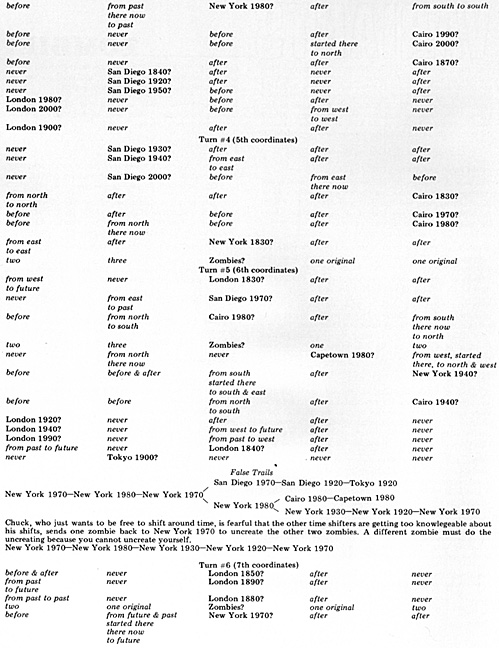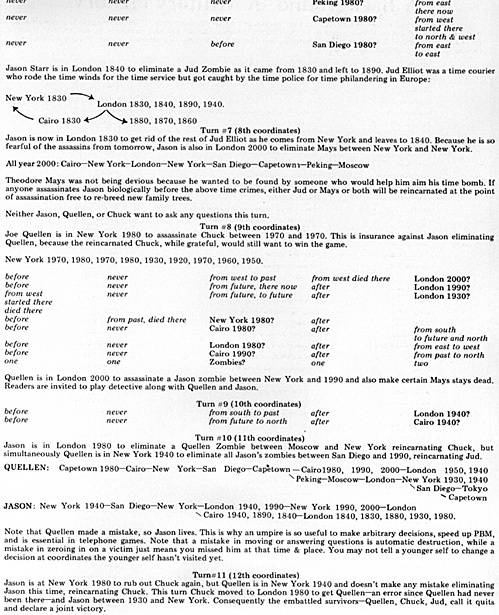Last issue of CONFLICT we presented a Science-Fiction cerebral game ASSASSIN! Despite a number of displeased game enthusiasts, ASSASSIN! was well received by the SF gamers. We will be publishing more games like ASSASSIN! in future issues of CONFLICT, but only as supplementary games to the historical wargames (and other games) that will appear in the same issue. In this way we will cover as many interests in the field of human conflict as our format enables us.
Copyright © 1973, Mcintyre, Goodrich, Games
Same Coordinates Again
The main difference with the maze movement rules is that you may return to a time and place again. When you do so, you meet yourself, and may use the advanta~oe of hindsight to advise your younger self that it would be more advantageous to go to different coordinates than those you actually went to on the first visit.
Thus you are not only twice in the same time and place, but your younger self leaves in two different directions, thus creating a zombie. The more zombies you have, the more difficult it is for the enemy to assassinate all of you, and the more easy it is for all of you to track him down.
Note that when you revisit a time and place, it is not necessary to create a zombie. It is also possible to uncreate a zombie, by visiting the coordinates a third time. This is a very useful strategy when an enemy is tracing a zombie back to its point of origin, and the zombie disappears before the enemy gets too close.
Family Tree
A family tree is the biological sequence of travels, splitting, and looping of zombies. If you assassinate a victim before he splits into additional branches on the tree, then all those zombies descended from the victim also die. By "biologically before splitting" we mean an earlier game turn, when the zombies are younger, not historically such as an earlier year.
Killing the original assassin before he flowers into any zombies removes the whole family from the game, unless this assassination is undone by another surviving player. Suppose A kills B. Suppose C kills A in an earlier game turn before A killed B, this means A is no longer alive to kill B, and B is reincarnated into the game at the point where he was eliminated. He does not get any more turns to make up for the time he was out of the game, and must recreate his history after his eliminated death, from scratch.
It is possible to create a closed loop of assassinations affecting each other. When such an impossible situation occurs, the game is officially drawn.
Player Communications
Since all your zombies are in mental telepathic communication with each other, more than five of them causes the lot to go insane, losing the game.
Only players may ask questions, not zombies. Players may also ask a second type of question: "How many zombies do you have surviving" or "How many zombies have you created including the original single assassin?"
No player may ask more than five questions of any type per tum.
You only need know one string of jumps to focus in on a victim, regardless of zombies in the area.
Optional Rules
You may drop the reincamation rule, make zombie creation to be announced, change the limit on zombies, re turn insane families to sanity if their number drops below five.
Reconnaissance
Each surviving spy not involved in combat can inspect one set of coordinates that it is within his ability to travel to in the next turn. Reconnaissance is automatic for the coordinates of the assassin regardless of combat, unless he dies before he can report in. Note that this changes the rule on questions to avoid a protracted correspondence per tum, and invite splitting up patrols.
What he is inspecting will change during the course of the game, but it is too much work for a coordinator to change 10 reports for every player per turn for every previous turn. Thus players must reinspect in subsequent turns. If a spy dies, he doesn't report in. If he is reincarnated, his report is on what he sees at the moment of reincarnation.
Time Puzzle
Can readers determine from the clues what time travel novels the characters come from?
SAMPLE GAME OF ZOMBIE!
Rule variants: No questions permitted till 3rd turn (4th location). When a player first asks about a city no one else can ask about it for two turns, then anyone can ask about it. No player may introduce more than one such new city per turn. (All rule variants must be spelled out at the beginning of any game.)Jud Elliot, Joe Quellen, Chuck Percival, Jason Starr, and Theodore Mays are the protagonists, competing for best understanding of time teleportation paradoxes. Readers are urged to figure out what has been discovered so far before reading on.



Back to Conflict Number 4 Table of Contents
Back to Conflict List of Issues
Back to MagWeb Master Magazine List
© Copyright 1998 by Dana Lombardy
This article appears in MagWeb (Magazine Web) on the Internet World Wide Web.
Other military history articles and gaming articles are available at http://www.magweb.com